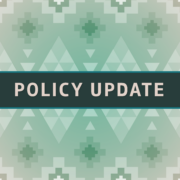NCUIH Submits Recommendations to HHS to include Support for Urban Native Communities in its Initiative to Strengthen Primary Health Care
On August 1, 2022, the National Council of Urban Indian Health (NCUIH) submitted written comments to the Department of Health and Human Services (HHS) Office of the Assistant Secretary for Health (OASH) in response to its request for information (RFI) regarding the HHS Initiative to Strengthen Primary Care. NCUIH supports HHS’ efforts to promote health equity and reduce barriers to care for underserved populations, including American Indians/Alaska Natives (AI/ANs). AI/ANs, including those in urban areas, face significant health disparities attributable in part to a lack of access to high-quality, culturally competent care. NCUIH strongly supports the purpose and scope of the Initiative in establishing a federal foundation that supports advancement towards the stated “goal state” of the practice of primary health care.
NCUIH made the following specific recommendations to HHS OASH:
- Support UIO models for health care delivery already in place at UIOs:
- NCUIH recommended that HHS address the need for continued and expanded support for UIOs.
- UIOs are a fundamental and inseverable component of the IHS, Tribal Health Program, and UIO (I/T/U) system. UIOs “are an important support to Native families and individuals seeking to maintain their values and ties with each other and with their culture,” which exist to provide “a wide range of culturally sensitive programs to a diverse clientele.”
- Address barriers to the delivery of care at UIOs like insufficient funding and resources:
- Presently, the ability of UIOs to expand upon their current offerings is severely limited by the chronic underfunding of the Indian health system generally, and UIOs in particular. In 2018, the average health care spending was $11,172 per person nationally, yet UIOs only received $672 per AI/AN patient.
- NCUIH requested that HHS engage with other federal agencies and Congress to advocate for advance appropriations for the IHS. In addition to a lack of funding, UIOs also face significant barriers to providing primary care to AI/ANs in urban areas due to uncertainty over the consistency and timing of federal funding.
- NCUIH requested that HHS consider supporting UIO recruitment efforts and increasing funding for staff at UIO facilities. UIOs have long faced understaffing issues that reduce the number of patients they can serve and the quality of service at each facility.
- Establish an Urban Confer Policy
- NCUIH recommended that HHS establish an Urban Confer policy to seek UIO input to guide HHS actions to strengthen primary health care. An Urban Confer is an established mechanism for dialogue between federal agencies and UIOs. Urban Confers are responses to decades of deliberate federal efforts (i.e., forced assimilation, termination, relocation) that resulted in 70 percent of AI/AN people living outside of Tribal jurisdictions, thus making Urban Confers integral to addressing the care needs of most AI/AN persons.
- The development of an HHS Urban Confer policy will help coordinate and integrate care between UIOs and HHS, including the relevant agencies and Departments within HHS that have a trust responsibility to provide care to AI/ANs no matter where they live.
- An urban confer policy will also help HHS fulfill the United States’ national policy, set forth by Congress, “to ensure maximum Indian participation in the direction of health care services so as to render the persons administering such services and the services themselves more responsive to the needs and desires of Indian communities.”
Background on the HHS Initiative to Strengthen Primary Care
Access to high-quality primary health care has been shown to improve health equity and health outcomes, however, the United States’ primary health care foundation is weakening and in need of support: primary health care is under-resourced; the workforce is shrinking; workforce well-being is in peril; and many practices face reimbursement challenges that may result in financial instability. In response to this, OASH launched the Initiative in September 2021 to develop a federal foundation for the provision of primary health care for all that supports improved health outcomes and advanced health equity. The goals of the Initiative are to:
- Support health and wellness through sustained partnerships with patients, families/caregivers, and their communities;
- Equitably provide first contact access to all, as well as whole person, comprehensive care over time, using interprofessional teams; and
- Coordinate and integrate care across systems, including other health care providers, public health, and community-based health promotion and social service organizations.
The first task of the Initiative is to develop an initial HHS plan for strengthening primary health care that will delineate specific actions that HHS agencies and offices may take to achieve the aims, within the current legislation and funding environment. The plan will also include actions that establish an infrastructure in HHS to continue its focus on strengthening primary health, develop subsequent HHS plans that build on the initial plan, and monitor progress and impact. The purpose of OASH’s June 15 RFI was to provide OASH with diverse perspectives, experiences, and knowledge that may inform the development of the initial plan for HHS, as well as future steps for the Initiative.
NCUIH remains committed to advocating for the health rights of urban AI/ANs and continues to respond to requests for information when applicable.







Leave a Reply
Want to join the discussion?Feel free to contribute!